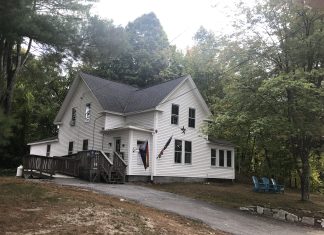Imagine walking into a room of familiar faces, but having to pretend you don’t know them. You’re dressed up in business attire and have been preparing for this interview process for the better part of the semester–you think you’re ready, and the faculty you’ve grown to know sit around you, expecting your best and ready to help you in whatever path you want to follow.
For Education majors entering the certified teaching program, this is a reality. The application process is multi-faceted; Education majors must meet multiple requirements, such as passing the Praxis tests, a series of tests that measure knowledge and skills, passing core classes here at NEC, putting together a portfolio of work, getting a letter of recommendation from a faculty member outside the Education Department, and then finally attending an interview to show their progress and professionalism.
Debra Nitschke-Shaw, Associate Dean of Education Division, said, “I think what’s really important to understand is that the process students go through replicates the process of getting a job.”
Although it may seem like a lengthy and difficult process, the faculty are trying to help students on their path to success, not hinder them. For example, students are given ample time to prepare for their interview in addition to practice questions so they can ensure their success.
“We don’t want this to be a ‘gotcha,’ we want this to be an opportunity for you to fine tune your ability to interview well and to have the poise and articulation skills to say what you need to say,” continued Nitschke-Shaw.
If students do not meet the requirements for certification, or do not want to become certified, there are other paths within the Education Major, like Education Community and Outdoor Leadership. The application process helps discover those students and aids them in achieving their goals, according to Nitschke-Shaw.
Some other departments are thinking of employing similar requirements, in order to aid students as much as possible, in addition to making sure students are ready for professional life after college. The Art Department already has something in place, according to Inez McDermott, Director of Project Pericles, Co-Director of Center for Community Engagement and Leadership, and Professor of Art.
“However, in my experience we have never said to someone: no, you can’t be an art major,” she continued.
This application process occurs in the fall of junior year, and is an opportunity for the whole art department to meet with students and discuss their strengths, weaknesses, and where they might want to put in a little extra effort.
“You might call it a developmental review,” said McDermott.
According to McDermott, art is something that sometimes takes many years to develop, and so it is not practical or fair to deny entry based simply off of talent. What’s more important is work ethic, which is what the developmental review helps establish. However, when the major grows she can see them “having to maintain a certain standard.”
The Creative Writing department shares similar sentiments, according to Maura MacNeil, Program Director of Professional Writing, and Associate Professor of Writing Andrew Morgan. They are working on creating a required sophomore review process, that would “create a system where students entering the program would be able to articulate their intent for the future so we can best serve them,” similar to the process already in place for Art majors, and mirroring the mindset of faculty members in the Education Department.
Some Education majors believe that the application process is something that positively helps them engage in both the NEC community and their professional communities outside of school, and is something that should be introduced to more majors.
The whole process, according to senior Kelly Robinson, an Elementary/Special Education Major, really teaches students professionalism. It requires students to think about the way they present themselves to the community; they have to dress and act appropriately, even when not in a classroom setting, and the application process establishes the importance of this.
“I wish some of the other majors would do that too,” she said.
Senior Abbey Archambault, a Secondary English/ Special Education Major, agrees, but also says that the process “holds you accountable,” for your actions and future. Another important thing about the process, according to Archambault, is that is provides a sense of community after reaching that bar. By going through the process, you are acknowledging that this is what you’re going to do with your life.
To Physical Education Major Sean Doherty, the process also “weeds out the people that don’t want to actually [put in the work].”
According to Nitschke-Shaw, however, most students do very well with the process, and those that don’t find alternative paths towards what they wish to accomplish in their lives.
When asked about whether NEC majors should employ more programs like this, she said: “If you want to set the bar for expectations, students will achieve them. So I think having an entry point where students can display what they’ve done, [and where] the faculty can celebrate their successes and guide them in their next steps, I see it as a good thing.”
McDermott is on the fence about requiring more majors to have such a process, though, saying, “I think for most of the majors here we need to be a little bit more tolerant and a little bit more developmental in our work with students.”
“One of the best things about NEC,” she continued, “is that we take students as they come and we work with them individually to get them to grow and develop. I would hate for, after only four semesters, to be the decision maker for them.”
McDermott did acknowledge that “sometimes a wake up call can be a very good thing,” and believes that perhaps a basic study in the field could be offered instead of a concentration, if students can’t meet the application requirements.
It’s too soon to tell whether or not this application will catch on for other departments other than the Creative Writing Program, but as for right now, many students and faculty agree that it could be a good thing for both students and faculty.
After all, according to Nitschke-Shaw, “the more we can do to prepare you for your careers after here, why not?”



















